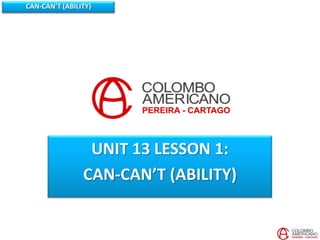Course 5-Unit 13: Can - can not for abilities.
- 1. CAN-CAN’T (ABILITY) UNIT 13 LESSON 1: CAN-CAN’T (ABILITY)
- 2. CAN-CAN’T (ABILITY) DO YOU HAVE ABILITIES?
- 3. CAN-CAN’T (ABILITY) CAN YOU KNIT?
- 5. CAN-CAN’T (ABILITY) CAN YOU DANCE?
- 7. CAN-CAN’T (ABILITY) CAN YOU PLAY THE PIANO?
- 9. CAN-CAN’T (ABILITY) CAN YOU SEW?
- 11. CAN-CAN’T (ABILITY) CAN YOU DRIVE?
- 13. CAN-CAN’T (ABILITY) CAN YOU DO KARATE?
- 15. CAN-CAN’T (ABILITY) CAN: DEFINITION AND CONSTRUCTION CAN: •It is used to describe ABILITIES. Let’s remember something first…
- 18. CAN-CAN’T (ABILITY) CAN VERB (IN BASE FORM) SUBJECT EXAMPLE: I CAN SING Yo puedo cantar CAN… CONSTRUCTION:
- 19. CAN-CAN’T (ABILITY) CAN VERB (IN BASE FORM) SUBJECT EXAMPLE: I CAN SING Yo puedo cantar CAN… CONSTRUCTION:
- 20. CAN-CAN’T (ABILITY) EXAMPLE: I CAN SING Yo puedo cantar CAN VERB (IN BASE FORM) SUBJECT CAN… CONSTRUCTION:
- 21. CAN-CAN’T (ABILITY) EXAMPLE: I CAN SING Yo puedo cantar CAN VERB (IN BASE FORM) SUBJECT CAN… CONSTRUCTION:
- 25. CAN-CAN’T (ABILITY) HE CAN SING
- 26. CAN-CAN’T (ABILITY) CAN IS USED TO DESCRIBE ABILITIES…
- 28. CAN-CAN’T (ABILITY) AGAIN! • CAN • THEY
- 29. CAN-CAN’T (ABILITY) AGAIN! • CAN • PLAY THE GUITAR • THEY
- 30. CAN-CAN’T (ABILITY) THEY CAN PLAY THE GUITAR ABILITY
- 33. CAN-CAN’T (ABILITY) LET’S SUMMARIZE… COULD DEFINITION To describe abilities
- 34. CAN-CAN’T (ABILITY) LET’S SUMMARIZE… COULD DEFINITION To describe abilities CONSTRUCTION
- 35. CAN-CAN’T (ABILITY) LET’S SUMMARIZE… COULD DEFINITION To describe abilities CONSTRUCTION SUBJECT+CAN+VERB (in base form)+ COMPLEMENT
- 37. CAN-CAN’T (ABILITY) …IN AFFIRMATIVE REMEMBER! Base form of the verbs: Examples: Clean- Play- Study- Work SUBJECT CAN VERB (IN BASE FORM) COMPLEMENT FOR EXAMPLE: SHE CAN SEW.
- 38. CAN-CAN’T (ABILITY) REMEMBER! Base form of the verbs: Examples: Clean- Play- Study- Work SUBJECT CAN VERB (IN BASE FORM) COMPLEMENT FOR EXAMPLE: HE CAN NOT SING. … IN NEGATIVE NOT
- 39. CAN-CAN’T (ABILITY) … IN YES/NO QUESTIONS CAN SUBJECT VERB (IN BASE FORM) COMPLEMENT REMEMBER! Base form of the verbs: Examples: Clean- Play- Study- Work FOR EXAMPLE: CAN YOU PLAY THE PIANO?
- 40. CAN-CAN’T (ABILITY) CAN SUBJECT VERB (IN BASE FORM) COMPLEMENT REMEMBER! Base form of the verbs: Examples: Clean- Play- Study- Work FOR EXAMPLE: WHAT CAN YOU DO? WH … IN INFORMATION QUESTIONS
- 41. CAN-CAN’T (ABILITY) CONVERSATION: Carlos, you play the guitar very well!
- 42. CAN-CAN’T (ABILITY) CONVERSATION: Carlos, you play the guitar very well! Thank you Anita. I can play the guitar since I was 5 years old.
- 43. CAN-CAN’T (ABILITY) CONVERSATION: Carlos, you play the guitar very well! Thank you Anita. I can play the guitar since I was 5 years old. Can you sing, too?
- 44. CAN-CAN’T (ABILITY) CONVERSATION: Carlos, you play the guitar very well! Thank you Anita. I can play the guitar since I was 5 years old. Can you sing, too? No, I can´t. and you?
- 45. CAN-CAN’T (ABILITY) CONVERSATION: Carlos, you play the guitar very well! Thank you Anita. I can play the guitar since I was 5 years old. Can you sing, too? No, I can´t. and you? Yes, I can sing. and I can dance, too.
- 46. CAN-CAN’T (ABILITY) CONVERSATION: Carlos, you play the guitar very well! Thank you Anita. I can play the guitar since I was 5 years old. Can you sing, too? No, I can´t. and you? Yes, I can sing. and I can dance, too.Description of Abilities.

